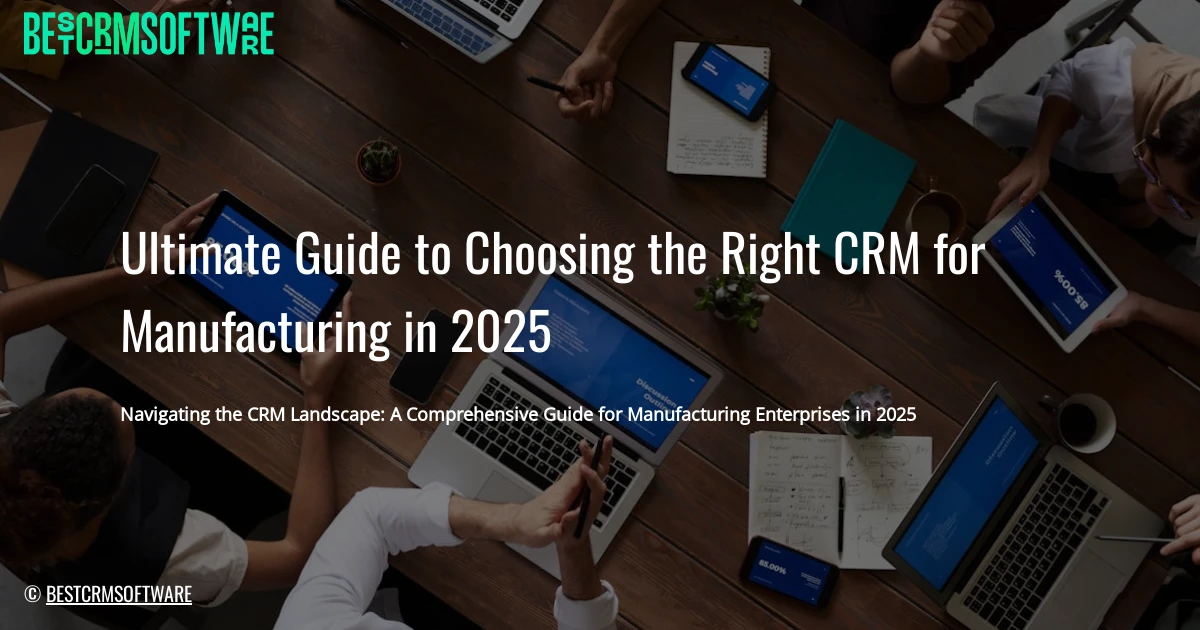Navigating the CRM Landscape: A Comprehensive Guide for Manufacturing Enterprises in 2025
Introduction: The Manufacturing CRM Imperative
The manufacturing landscape is undergoing a rapid and transformative evolution, driven by disruptive technologies, changing customer expectations, and a growing need for efficiency and agility. By 2025 and beyond, the industry will be characterized by hyper-personalized experiences, interconnected supply chains, and advanced automation. Navigating this evolving landscape requires a powerful digital foundation, and at the heart of this transformation lies Customer Relationship Management (CRM).
Understanding the Evolving Manufacturing Landscape in 2025 and Beyond:
- Increased Customization: Consumers demand tailored products and services, demanding manufacturers to embrace customization and build strong relationships with individual customers.
- Data-Driven Decision Making: Leveraging vast amounts of data to optimize operations, improve product quality, and anticipate customer needs is crucial for survival.
- Global Supply Chain Interconnectivity: Manufacturers are building interconnected global supply chains requiring robust communication, collaboration, and real-time visibility.
- Digital Twin Technology: Digital twins are revolutionizing how manufacturers design, develop, and manage assets. This will lead to more proactive maintenance and better operational efficiency.
- Sustainable Manufacturing: Environmental concerns are pushing manufacturers to adopt sustainable practices, track carbon footprint, and engage customers in their eco-conscious initiatives.
The Crucial Role of Digital Transformation in Modern Manufacturing:
In this dynamic environment, digital transformation becomes the key to success. Manufacturing companies are investing heavily in technology to:
- Improve operational efficiency and productivity: Streamline processes, optimize resource allocation, and reduce downtime.
- Enhance customer experience: Deliver personalized experiences, increase customer loyalty, and build lasting relationships.
- Gain a competitive advantage: Respond swiftly to market demands, optimize resource allocation, and capitalize on emerging opportunities.
- Make data-driven decisions: Leverage real-time data analytics for proactive planning, resource management, and operational optimization.
Specific CRM Needs for Enterprise Manufacturers:
While CRM plays a critical role across all industries, manufacturing poses unique challenges that necessitate specialized CRM solutions:
- Managing Complex Sales Cycles: Manufacturing sales often involve multiple stakeholders and long sales cycles requiring sophisticated relationship management tools.
- Tracking Product Life Cycles: CRM systems must track products from design to delivery and after-sales support, managing data across different stages of the product lifecycle.
- Collaboration across the Supply Chain: Seamless collaboration between manufacturing, sales, service, and suppliers requires a CRM that fosters strong communication and data sharing across all stakeholders.
- Personalized After-Sales Support: Customer support in the manufacturing industry requires a personalized approach. CRM solutions can enable efficient issue resolution, knowledge sharing, and ongoing engagement.
- Compliance and Regulatory Reporting: The manufacturing industry is subject to stringent regulations. CRM must enable seamless compliance with relevant standards, tracking, and reporting.
By carefully selecting a CRM that aligns with these evolving needs, manufacturing companies can unlock a future characterized by innovation, customer-centricity, and lasting profitability.
The Power of CRM for Manufacturing Enterprises
The modern manufacturing landscape demands agility, efficiency, and a laser focus on customer satisfaction. Enter Customer Relationship Management (CRM) – a powerful tool that empowers manufacturers to optimize operations, enhance customer relationships, and unlock data-driven growth. Let’s explore how CRM can revolutionize your manufacturing enterprise:
CRM Systems 101 for Manufacturers: Key Functions & Benefits
Imagine a centralized hub where you can manage every aspect of customer interactions – from initial lead capture to post-sale support. That’s the promise of CRM. Beyond contact management, manufacturers can leverage CRM for:
- Lead Generation & Qualification: Identify and prioritize potential customers with tailored lead nurturing campaigns.
- Sales Pipeline Management: Visualize and track opportunities, manage sales cycles, and predict future revenue streams.
- Order Management: Automate order processing, track inventory levels, and streamline delivery processes.
- Customer Service & Support: Centralize customer interactions, manage issues, and improve response times with automated ticketing systems.
- Marketing Automation: Target specific customer segments with personalized campaigns and analyze campaign performance for optimization.
The benefits of adopting CRM in manufacturing are multifold:
- Improved Customer Retention: Delivering personalized experiences and consistent service fosters loyalty and increases customer lifetime value.
- Enhanced Sales Productivity: Streamlined processes and data-driven insights empower sales teams to focus on closing deals.
- Optimized Inventory & Supply Chain: Accurate forecasting and real-time insights into customer demand lead to smoother supply chain operations and reduced waste.
- Increased Efficiency & Reduced Costs: Automating manual tasks and streamlining workflows allows for significant resource optimization and cost savings.
Streamlining Operations: From Lead to Order Fulfillment
Imagine this scenario: A potential customer finds your product online. They request a quote, but the information gets lost in an email chain. Then, during the sales process, the team struggles to access order history and past communications, leading to delays and frustration.
CRM integrates all customer touchpoints into a unified system. From lead generation and quote creation to order fulfillment and ongoing support, every stage of the customer journey is streamlined and easily accessible.
Boosting Sales Performance & Enhancing Customer Relationships
A key strength of CRM is its ability to analyze customer data and uncover valuable insights. These insights enable personalized communication strategies that resonate with customers.
For manufacturers, this means creating targeted marketing campaigns that reach the right audience with the right message. It also means providing customized support and service that address specific needs, ensuring customer satisfaction.
Data-Driven Decision Making for Manufacturing Excellence
The data stored in your CRM is a treasure trove of insights waiting to be mined. Leveraging CRM’s powerful analytics features, manufacturers can:
- Track Key Performance Indicators (KPIs): Analyze metrics like conversion rates, customer satisfaction scores, and sales pipeline performance to identify areas for improvement.
- Identify Trends & Patterns: Gain insights into customer behavior, market trends, and competitor activities to anticipate future needs and opportunities.
- Optimize Resource Allocation: Allocate resources to high-performing initiatives and maximize return on investment.
By embracing data-driven insights, manufacturers can make smarter decisions, streamline operations, and achieve greater efficiency and growth.
The adoption of CRM systems is crucial for manufacturers to remain competitive and thrive in the years to come. It empowers them to understand their customers better, enhance sales performance, and ultimately unlock data-driven manufacturing excellence. In our next section, we’ll dive into the selection process, exploring different CRM types and key considerations for choosing the perfect platform for your business.

© Lex Photography
Step 1: Assessing Your Manufacturing CRM Needs
Before diving headfirst into the exciting world of CRM options, you need to understand your specific manufacturing needs. This involves a thorough self-assessment that sets the foundation for a successful CRM implementation.
Here’s how to start:
Defining Your Manufacturing Business Goals & Objectives:
- What are your short-term and long-term business objectives? This could include anything from boosting sales and increasing efficiency to streamlining operations and enhancing customer satisfaction.
- What specific metrics will you use to track success? This helps you choose a CRM that aligns with your key performance indicators (KPIs).
- How will a CRM help you achieve these goals? Determine the specific functionalities and features needed to reach your objectives.
Identifying Pain Points & Areas for Improvement:
- What are the biggest challenges your business currently faces? Focus on areas that negatively impact customer relations, production, sales, or profitability.
- Are there areas where manual processes create inefficiencies? Look for bottlenecks in your workflows and assess if automation could streamline these processes.
- How can technology be leveraged to solve these problems? Identify potential solutions, including CRM capabilities that address your pain points.
Mapping Out Your Current Manufacturing Processes & Workflows:
- Create a detailed diagram or flowchart of your existing processes. This helps visualize where data flows, identify redundancies, and pinpoint potential points for optimization.
- Assess each step for potential improvements. Consider how a CRM can streamline each step, such as automating order tracking, improving communication, or simplifying lead generation.
- Define how a CRM should integrate with existing systems. Ensuring seamless integration with your ERP, inventory management systems, or other critical software is essential for a successful CRM deployment.
By thoroughly addressing these points, you’ll gain a deep understanding of your unique manufacturing needs. This crucial groundwork allows you to pinpoint specific CRM features and functionalities that address your specific pain points, improve efficiency, and ultimately achieve your desired business goals.
Step 2: Exploring Key CRM Features & Deployment Options
Choosing the right CRM for your manufacturing business requires careful consideration of various features and deployment options. Here, we delve into three crucial aspects:
On-Premise vs. Cloud-Based CRM Solutions for Manufacturers:
- On-Premise: This option involves installing and managing the CRM software on your own servers. While offering more control over data and security, it necessitates significant upfront investment, ongoing maintenance, and a dedicated IT team. On-premise CRMs can be ideal for manufacturers with highly sensitive data or specific regulatory compliance needs.
- Cloud-Based: Hosted in the cloud, these solutions require no installation and can be accessed from any device with an internet connection. Cloud-based CRMs are often more cost-effective, scalable, and offer automatic updates, making them attractive for manufacturers looking for agile solutions.
Customization & Scalability for Your Unique Manufacturing Needs:
- Customization: Each manufacturer has unique processes and data requirements. Your chosen CRM should offer flexibility for customization. Look for features allowing you to:
- Configure dashboards and reports tailored to your manufacturing data.
- Tailor workflows and processes to suit your specific workflows, like order fulfillment or product development.
- Customize fields and data models to accommodate your unique data points.
- Scalability: As your manufacturing business grows, your CRM must adapt. Choose a solution that can handle increasing data volumes, user accounts, and complexities without compromising performance. Scalability also encompasses the ability to integrate new modules as your business expands into different areas, such as supply chain management or marketing automation.
Integration Capabilities with Existing Manufacturing Systems:
- Seamless Integration: Effective CRM implementation involves connecting your existing manufacturing systems like ERP (Enterprise Resource Planning), PLM (Product Lifecycle Management), or MES (Manufacturing Execution System) to create a holistic view of your operations.
- API (Application Programming Interface) Access: A strong CRM will offer robust APIs allowing for easy integration with various systems. Look for pre-built connectors for common manufacturing applications and ensure the CRM is open enough to integrate with your niche software.
- Data Sync and Collaboration: The CRM should seamlessly sync data across integrated systems, preventing information silos and ensuring accurate, up-to-date data availability.
By thoughtfully considering these factors, manufacturers can choose a CRM solution that aligns with their current and future needs, fostering a streamlined, efficient, and data-driven environment.

© Andrea Piacquadio
Step 3: Researching CRM Providers for Manufacturing
Now that you have a clear understanding of your manufacturing business needs and CRM functionalities, it’s time to dive deep into the world of CRM vendors. This step involves meticulous research to identify the ideal partner that will streamline your processes and drive growth. Here’s a comprehensive guide to help you navigate the CRM landscape:
Leading CRM Vendors Specializing in Manufacturing Solutions
The market boasts numerous robust CRMs, but some players have specifically tailored their offerings to address the unique demands of manufacturing companies. Look for vendors who have:
- Deep Industry Expertise: These providers understand the nuances of your industry, including supply chain dynamics, production processes, and regulatory compliance.
- Manufacturing-Specific Features: This includes functionalities such as inventory management, production planning, quality control, and customer service modules built for the industry.
- Integration Capabilities: Seamless integration with existing manufacturing systems like ERP, MES, and PLM is critical for a smooth transition and improved efficiency.
Niche Players Catering to Specific Manufacturing Sub-Sectors
Not all manufacturers have the same needs. Some players specialize in specific sub-sectors of manufacturing, such as:
- Automotive: These CRMs may focus on customer relationship management for car dealerships, providing tools for sales, service, and marketing within this specific industry.
- Aerospace: Companies working in aerospace often have intricate supply chains and stringent regulatory requirements. Specific CRMs cater to their unique challenges.
- Pharmaceutical: Compliance is paramount in pharmaceuticals, so dedicated CRMs are designed to manage data, track quality, and ensure adherence to regulations.
By identifying niche players focused on your specific sub-sector, you gain access to customized features and specialized expertise that directly address your industry-specific requirements.
Analyzing Industry Reputation & Track Record of Success
Once you have shortlisted potential vendors, delve deeper into their reputation and success in the manufacturing domain. This involves:
- Customer Reviews & Testimonials: Examine third-party review platforms and case studies to understand how existing customers are leveraging the CRM and their satisfaction level.
- Industry Awards & Recognition: Check if the vendor has received awards or recognition for their expertise in the manufacturing space, highlighting their proven capabilities.
- Implementation Expertise: Inquire about their experience in successful CRM implementations for similar businesses in the manufacturing sector, assessing their capabilities to understand your unique challenges.
By scrutinizing their reputation and track record, you gain insights into their ability to deliver value and meet your specific requirements for success in the competitive landscape of 2025. This thorough research process ensures you choose the right partner to unlock the full potential of your CRM solution in manufacturing.
Step 4: Evaluating & Shortlisting Potential CRM Vendors
Once you’ve narrowed down your list of potential CRM vendors, it’s time to dive deeper and really understand what each platform can offer. This step is crucial for making an informed decision that will ultimately lead to successful CRM implementation and a positive impact on your manufacturing business. Here’s how to approach this crucial evaluation phase:
1. Requesting Detailed Product Demonstrations & Trials:
- Don’t settle for generic overviews: Request tailored demonstrations showcasing features and functionalities relevant to your specific manufacturing processes, pain points, and objectives.
- Focus on real-world scenarios: Ask the vendors to illustrate how their CRM handles scenarios you frequently encounter, such as managing production schedules, tracking inventory, handling customer support tickets, or generating sales reports.
- Trial period is essential: Insist on a free trial period. This allows you to thoroughly test the software’s usability, functionality, and integration capabilities in your actual work environment.
2. Seeking References from Similar Manufacturing Companies:
- Reach out to existing clients: Contact current customers in the manufacturing industry using the CRM solution. Get their honest feedback on the platform’s effectiveness, usability, support quality, and overall impact on their operations.
- Ask for case studies: Request case studies or success stories showcasing how other manufacturing companies have successfully implemented the CRM and achieved measurable results.
3. Comparing Pricing Models & Return on Investment (ROI):
- Don’t just focus on upfront costs: Compare different pricing models (per user, per feature, subscription-based) and explore hidden costs such as implementation fees, customization charges, and ongoing support services.
- Estimate the ROI: Analyze the potential benefits the CRM could bring to your business, such as increased efficiency, reduced costs, improved customer satisfaction, and increased sales. This helps you justify the investment and ensure the chosen CRM delivers a positive return on your investment.
By meticulously evaluating each vendor through these methods, you can effectively narrow down your list to the top 2-3 contenders that align best with your manufacturing needs. Remember, the final choice should be based on a comprehensive assessment considering factors such as ease of use, feature set, cost-effectiveness, support quality, and overall fit with your company’s goals and culture.

© Visual Tag Mx
Step 5: Planning a Successful CRM Implementation
Successfully implementing a CRM system is crucial for achieving the desired benefits and maximizing your investment. This step goes beyond simply choosing the right CRM software; it involves careful planning, execution, and ongoing support to ensure smooth adoption and sustained value.
Here are key considerations for a seamless implementation process:
Key Considerations for Seamless CRM Implementation
- Define Clear Goals & Objectives: Establish specific, measurable, achievable, relevant, and time-bound (SMART) goals for your CRM implementation. These goals will serve as benchmarks to measure progress and ensure you stay on track.
- Align with Business Processes: Your CRM should seamlessly integrate with your existing business processes. Analyze and optimize workflows before implementation to eliminate any potential clashes or inefficiencies.
- Establish Strong Communication & Collaboration: Open and consistent communication is vital throughout the implementation process. Involve key stakeholders, including users, IT professionals, and management, to foster transparency, address concerns, and ensure a shared understanding of goals and progress.
- Prioritize Data Integrity & Accuracy: Data is the lifeblood of your CRM. Invest time in ensuring data quality through proper cleaning, standardization, and deduplication before migration. Clean data leads to accurate insights and better decision-making.
- Choose the Right Implementation Approach: Different approaches are available, from full-scale implementation to phased rollout. The chosen approach should align with your business needs and resources. Consider hiring a consultant or engaging a vendor to guide the process.
Data Migration Strategies & System Integration Best Practices
Data migration is a crucial step in CRM implementation. Here are essential best practices to ensure smooth transitions:
- Comprehensive Data Mapping & Analysis: Carefully analyze and map your existing data from legacy systems to your new CRM. This process helps identify potential discrepancies, missing information, and data quality issues.
- Choose a Suitable Migration Method: Select a suitable data migration method based on data volume, complexity, and time constraints. Options include direct data import, incremental data migration, and cloud-based integration.
- Thorough Testing & Validation: Perform extensive testing on the migrated data to ensure accuracy and integrity. Validate against source data and test reports to ensure consistency and resolve any issues before going live.
- Secure & Controlled Environment: Implement robust security protocols and access control during the migration process. Ensure data integrity and compliance with privacy regulations throughout the transition.
Ensuring User Adoption & Providing Adequate Training Resources
User adoption is crucial for maximizing the value of your CRM investment. Focus on the following elements to encourage user buy-in:
- Engage Users from the Beginning: Involve users early in the planning and development stages, gathering feedback on needs, preferences, and challenges.
- Clear User Guides & Training Resources: Provide clear and concise documentation, online tutorials, and in-person training sessions to equip users with the knowledge and skills to utilize the CRM effectively.
- Ongoing Support & Maintenance: Offer ongoing support to answer questions, troubleshoot problems, and keep users engaged with the new CRM system.
- Track & Monitor User Activity: Track user engagement and analyze usage patterns to identify areas for improvement and provide personalized support to individual users.
By addressing these considerations, you’ll lay a strong foundation for successful CRM implementation, fostering long-term success and driving continuous improvement in your manufacturing processes. Remember, a well-planned and carefully executed implementation ensures the right CRM becomes a strategic asset that helps your business thrive.
Step 6: Tracking Results & Maximizing CRM Value
A CRM isn’t a magic bullet; it requires active engagement and ongoing optimization to yield the desired results. Once your manufacturing CRM is implemented, the real journey begins – the journey of maximizing its value. This is where the art of tracking, measuring, and analyzing data comes in.
Measuring the Success of Your Manufacturing CRM Implementation
Beyond the initial hype and excitement, a clear and actionable plan for measuring success is crucial. You need to determine your goals and metrics for judging the effectiveness of your CRM deployment. These goals could include:
- Increased customer satisfaction: Are customers experiencing faster responses, improved communication, and a better overall experience?
- Enhanced lead conversion rates: Does your CRM effectively nurture leads and guide them through the sales funnel, leading to increased conversion rates?
- Improved efficiency and productivity: Are sales, marketing, and customer service teams collaborating more effectively, leading to reduced workload and higher efficiency?
- Increased revenue generation: Is the CRM contributing to a measurable increase in revenue through better customer engagement and optimized sales cycles?
Monitoring Key Performance Indicators (KPIs) & Metrics
To monitor the success of your CRM implementation, identify relevant KPIs and metrics specific to your business goals and needs. Some examples include:
- Lead conversion rate: Measures the percentage of leads that become paying customers.
- Customer lifetime value (CLTV): Indicates the average total revenue a customer generates for your company over their lifespan.
- Customer satisfaction scores: Gauge customer sentiment and the effectiveness of customer service interactions.
- Sales cycle time: Tracks the duration of the sales process, allowing for optimization efforts.
- Return on investment (ROI): Calculates the return generated from your CRM investment.
Regularly tracking and analyzing these metrics will provide insights into the performance of your CRM and identify areas for improvement.
Leveraging CRM Data for Continuous Improvement & Optimization
The true value of a manufacturing CRM lies in its ability to deliver actionable data for continuous improvement. Regular analysis of your CRM data can help you:
- Optimize your sales processes: Identify bottlenecks, adjust strategies, and personalize customer interactions based on data-driven insights.
- Fine-tune your marketing campaigns: Target the right audiences with relevant messages and maximize your return on advertising spend.
- Enhance customer service efficiency: Provide quick and accurate responses to customer inquiries, resolve issues efficiently, and create a positive customer experience.
- Discover emerging trends and opportunities: Identify customer behavior patterns, emerging markets, and market shifts to stay ahead of the competition.
- Make data-driven decisions: Back up strategic decisions with hard data, providing a solid foundation for business growth and expansion.
By embracing continuous improvement, actively using data to make adjustments, and leveraging the power of your CRM, your manufacturing organization can truly unlock the transformative potential of customer relationship management.

© Christina Morillo
Beyond 2025: The Evolving Landscape of Manufacturing CRMs
The manufacturing landscape is undergoing a rapid transformation, fueled by technological advancements and shifting customer expectations. As we move further into 2025 and beyond, manufacturing CRMs will need to evolve to meet these dynamic needs.
The Future of Manufacturing CRMs: Emerging Trends & Innovations
- Cloud-Native and Microservices Architecture: Expect a shift towards fully cloud-based platforms with a microservices architecture, allowing for greater flexibility, scalability, and integration with other systems.
- Internet of Things (IoT) Integration: CRMs will increasingly incorporate data from connected machines and devices, providing real-time insights into production processes, equipment performance, and potential issues.
- Augmented and Virtual Reality (AR/VR): Visualizing product designs, collaborating with remote teams, and providing immersive customer experiences are expected to be further facilitated by AR/VR integration.
The Role of Artificial Intelligence (AI) & Predictive Analytics
- AI-Powered Sales Forecasting and Demand Planning: Advanced algorithms can analyze vast datasets to provide more accurate forecasts, optimizing resource allocation and mitigating supply chain disruptions.
- Automated Lead Generation & Qualification: AI can analyze customer interactions and behaviors, identifying potential leads and automatically qualifying them for sales opportunities.
- Predictive Maintenance: AI algorithms can analyze sensor data from equipment to anticipate potential failures, allowing manufacturers to schedule preventative maintenance and avoid costly downtime.
Leveraging Data for Enhanced Customer Experiences & Product Development
- Personalized Customer Journeys: CRMs will use data to deliver tailored communications, offers, and support to individual customers based on their specific needs and preferences.
- Data-Driven Product Development: Insights gleaned from customer interactions and market trends can be leveraged to develop innovative products that meet evolving needs.
- Improved Supply Chain Transparency: By integrating CRM data with supply chain management systems, manufacturers can gain a holistic view of their operations, ensuring smooth delivery and exceptional customer service.
In conclusion, the future of manufacturing CRMs lies in harnessing emerging technologies and data to enhance operational efficiency, personalize customer experiences, and drive product innovation. By embracing these trends, manufacturing companies can gain a competitive edge in the dynamic marketplace of tomorrow.
Data Security & Compliance: A Top Priority for Manufacturing
The manufacturing industry handles a vast amount of sensitive data, from customer information and intellectual property to production plans and financial records. This makes data security and compliance an absolute priority when selecting a CRM system. A breach of this data could have devastating consequences, impacting your brand reputation, customer trust, and operational efficiency.
Here’s how to navigate the complexities of data security and compliance within the manufacturing landscape:
Data Security & Compliance Requirements for Manufacturing Data:
- GDPR, CCPA, and other regulations: Understanding and adhering to evolving data privacy laws like the General Data Protection Regulation (GDPR) and the California Consumer Privacy Act (CCPA) is essential. These regulations place specific requirements on how manufacturing companies collect, store, and use personal information.
- Industry-Specific Compliance Standards: Many industries have their own compliance standards, such as HIPAA in healthcare or the Payment Card Industry Data Security Standard (PCI DSS) for payment processing. Manufacturing may have its own unique regulatory requirements based on the products or materials being handled.
- Cybersecurity Threats: The threat landscape for manufacturing is evolving constantly. You need a CRM solution that offers strong protection against cyber threats such as malware, phishing attacks, and ransomware.
Ensuring Privacy & Protection of Sensitive Customer Information:
- Data Encryption: Implement encryption technologies for data both in transit and at rest. This ensures that data cannot be read or accessed by unauthorized individuals even if the system is compromised.
- Access Control and User Permissions: Define strict access control policies to ensure only authorized personnel can access specific data.
- Regular Audits and Assessments: Conduct periodic audits and assessments of your CRM system to ensure security protocols remain effective and to identify any vulnerabilities that need to be addressed.
Choosing a CRM Provider with Robust Security Measures in Place:
- Third-Party Certifications: Look for providers with third-party certifications, like ISO 27001 (Information Security Management System) or SOC 2 (Service Organization Controls 2). These certifications demonstrate adherence to high security standards.
- Transparent Security Policies: A reliable CRM provider should have clearly defined security policies and be transparent about how they handle data.
- Data Backup and Disaster Recovery Plans: Ensure your provider has a robust data backup and disaster recovery plan in place to protect against data loss.
Selecting a CRM that meets these strict security and compliance standards is vital to ensure the safety of your data and the smooth operation of your manufacturing business.

© energepic.com
CRM Integration with Existing Manufacturing Systems
Choosing the right CRM for your manufacturing business goes beyond just finding a system that manages customer relationships. To truly optimize your operations and leverage data effectively, seamless integration with your existing manufacturing systems is crucial. This section will explore the critical integrations necessary for success in 2025 and beyond:
1. Integrating CRM with Enterprise Resource Planning (ERP) Systems:
- Benefits: ERP systems are the backbone of manufacturing operations, handling financials, inventory management, and production planning. Integrating your CRM with your ERP allows for a centralized view of customer data, production orders, and financial information. This results in:
- Streamlined Order Fulfillment: Orders placed through your CRM can be automatically transferred to your ERP, simplifying production scheduling and order processing.
- Enhanced Inventory Control: Track inventory levels and production capacity in real-time, ensuring efficient allocation of resources based on customer demand.
- Improved Customer Service: Customer service representatives have access to up-to-date information on order status, stock availability, and past purchase history.
- Implementation Considerations: Consider API integration between the chosen CRM and your ERP system. A bi-directional flow of data ensures accurate and timely communication across platforms.
2. Connecting CRM with Manufacturing Execution Systems (MES):
- Benefits: MES systems manage and monitor production operations, tracking real-time data like production runs, quality control, and equipment maintenance. Integrating your CRM with MES gives you:
- Real-Time Production Visibility: Gain immediate insights into production schedules, status, and potential delays, allowing for proactive communication with customers.
- Improved Quality Management: Track product quality data in real-time and connect it with customer feedback, leading to quicker identification and resolution of quality issues.
- Optimized Resource Allocation: Better understand customer demands and align production plans with market needs, reducing waste and maximizing resource utilization.
- Implementation Considerations: Implement robust data synchronization between your CRM and MES, ensuring seamless data flow for both inbound and outbound activities.
3. Creating a Unified Data Ecosystem for Improved Visibility & Collaboration:
- Benefits: Integrating CRM with both ERP and MES fosters a unified data ecosystem where all departments can access relevant information, improving collaboration and visibility. This leads to:
- Data-Driven Decision Making: Informed decisions based on real-time insights across the entire organization, leading to optimized resource allocation and improved customer experience.
- Reduced Communication Silos: Breaking down silos between departments through data sharing and streamlining processes.
- Enhanced Operational Efficiency: Improved coordination and collaboration across all levels of the organization, maximizing efficiency and productivity.
- Implementation Considerations: Prioritize robust data governance practices to maintain data integrity and security across the integrated systems.
In Conclusion: By effectively integrating CRM with your ERP and MES systems, you can unlock significant operational advantages in the competitive manufacturing landscape of 2025. These integrations pave the way for data-driven decisions, seamless communication, and optimized workflows, leading to increased customer satisfaction, improved production efficiency, and a stronger competitive edge.
Enhancing Supply Chain Efficiency with CRM
The modern manufacturing landscape demands agile and responsive supply chains to stay competitive. Thankfully, CRM technology can become a valuable tool for boosting efficiency and optimizing your supply network.
Leveraging CRM for Effective Supply Chain Management:
- Centralized Information Hub: A robust CRM acts as a single source of truth for all supply chain-related data. This includes supplier information, purchase orders, inventory levels, production schedules, and shipment details. This consolidated view helps prevent data silos, ensures consistency, and streamlines decision-making.
- Automated Tasks & Processes: By automating tasks like purchase order management, shipment tracking, and invoice processing, CRM eliminates manual work, reduces errors, and frees up valuable time for your team to focus on strategic initiatives.
- Real-time Data Analytics & Insights: CRMs provide real-time insights into supply chain performance, allowing you to identify bottlenecks, predict potential disruptions, and adjust operations accordingly. This data-driven approach optimizes inventory levels, reduces lead times, and minimizes the risk of delays.
Improving Supplier Collaboration & Communication:
- Enhanced Communication Channels: CRM facilitates seamless communication with suppliers through various channels like email, chat, and instant messaging. This enables real-time updates, quicker resolution of issues, and increased collaboration on production plans, lead times, and delivery schedules.
- Centralized Communication Platform: By consolidating all communication with suppliers within the CRM, you can avoid information overload and maintain a consistent record of interactions. This streamlines communication and ensures clear accountability.
- Supplier Performance Monitoring & Reporting: Track supplier performance against pre-defined metrics and identify areas for improvement. CRM empowers you to optimize your supplier base, cultivate strong relationships with high-performing vendors, and improve overall supply chain performance.
Enhancing Visibility & Transparency Across the Supply Network:
- Track Goods Movement in Real-time: With the help of CRM integration with GPS tracking and IoT technologies, you gain real-time visibility into the movement of goods across the entire supply chain. This helps you identify potential delays, optimize delivery routes, and ensure on-time delivery.
- Real-time Inventory Management: CRM offers a complete picture of inventory levels, from raw materials to finished products. This information allows you to make informed decisions about purchasing, production scheduling, and allocation, minimizing stockouts and waste.
- End-to-End Supply Chain Tracking: Gain full transparency into every stage of the supply chain, from supplier procurement to customer delivery. This helps identify inefficiencies, pinpoint areas for improvement, and measure the impact of changes on overall performance.
Conclusion:
By embracing a robust CRM solution, manufacturing businesses can unlock a world of benefits for their supply chains. With enhanced communication, real-time visibility, and intelligent automation, manufacturers can navigate today’s dynamic landscape with confidence, build stronger supplier relationships, and ultimately, deliver exceptional customer experiences.

© Anamul Rezwan
Optimizing Sales & Marketing with a Manufacturing CRM
The right CRM can be a game-changer for manufacturing businesses, particularly when it comes to maximizing sales and marketing efforts. By adopting a robust CRM system, manufacturers can:
1. Boosting Sales Team Productivity & Effectiveness:
- Centralized Customer Data: A CRM acts as a single source of truth for all customer-related information, from contact details to past interactions and purchase history. This provides salespeople with a complete understanding of each customer, enabling them to personalize their approach and deliver a more effective sales experience.
- Improved Lead Management: CRMs offer powerful lead management tools to effectively track and prioritize leads based on specific criteria, ensuring that sales teams focus on the most promising prospects. This optimizes lead nurturing processes and accelerates the sales cycle.
- Enhanced Collaboration & Communication: By providing a shared platform for communication and collaboration, CRMs allow sales teams to work together seamlessly, eliminating silos and facilitating efficient knowledge sharing. This streamlines communication, improves responsiveness, and fosters a more cohesive team effort.
2. Automating Sales Processes & Tasks to Free Up Time:
- Streamlined Sales Cycle: Automation features within CRMs automate repetitive tasks such as email sequences, lead qualification, and follow-ups, freeing up sales team members to focus on higher-value activities, like building relationships and closing deals.
- Personalized Customer Journey: Automation empowers the delivery of personalized experiences by tailoring communication and offers based on customer data and preferences, enhancing engagement and improving conversion rates.
- Time Savings and Increased Efficiency: By automating time-consuming tasks, CRM systems improve efficiency and productivity, allowing sales teams to achieve more with their limited time and resources.
3. Gaining Actionable Insights for Improved Sales Forecasting & Reporting:
- Data-Driven Insights: CRM systems provide real-time data and reporting dashboards, offering valuable insights into customer behavior, sales trends, and marketing campaign effectiveness.
- Accurate Forecasting: Data analysis allows for more accurate sales forecasting, which enables manufacturers to make informed decisions regarding production planning, resource allocation, and budget management.
- Effective Marketing Campaign Management: Data-driven insights facilitate more targeted marketing campaigns, optimizing resources and ensuring a higher return on investment.
By implementing a manufacturing-specific CRM, businesses can optimize their sales and marketing strategies, ultimately driving growth and profitability. The right CRM acts as a strategic tool that enables businesses to understand their customers better, improve team productivity, and make data-driven decisions for continued success.
Elevating Customer Service with CRM for Manufacturers
In 2025, manufacturing success hinges on exceeding customer expectations. This means more than just building quality products; it means delivering exceptional service and fostering strong customer relationships. A robust CRM system is the key to unlocking this potential, empowering manufacturers to:
- Improving Customer Service & Support Operations: A centralized hub for all customer interactions, a CRM system allows you to streamline and automate support processes, creating a seamless and efficient experience. From ticketing systems to knowledge bases, manufacturers can provide quick and consistent solutions, reducing wait times and boosting customer satisfaction.
- Providing Personalized & Timely Customer Interactions: Data is the lifeblood of exceptional service. By leveraging a CRM’s customer profiling capabilities, manufacturers can glean valuable insights into individual preferences, purchasing history, and even product usage. This data enables personalized communication, tailored product recommendations, and proactive customer engagement – demonstrating genuine care and fostering loyalty.
- Resolving Issues Quickly & Effectively to Improve Customer Satisfaction: CRM systems empower manufacturers to proactively address customer issues before they escalate into major concerns. By tracking communication history, identifying patterns, and leveraging internal resources, teams can efficiently resolve problems and implement corrective actions. This proactive approach not only strengthens customer relationships but also avoids costly damage to brand reputation.
In conclusion, a modern CRM solution is no longer a mere tool for lead generation or order management; it’s a critical component in transforming customer service into a competitive advantage. By leveraging the power of data-driven insights and automation, manufacturers can elevate their customer service to new heights, forging lasting customer relationships and driving sustained growth.

© Christina Morillo
Transforming Customer Relationships with CRM
The manufacturing industry is no stranger to demanding customers. In 2025, winning their loyalty will depend on forging stronger, more personalized relationships. This is where CRM shines, offering powerful tools to cultivate trust and engagement throughout the customer journey. Here’s how:
1. Personalizing the Customer Journey & Tailoring Experiences:
- Track and analyze interactions: Leverage data to gain deep insights into customer needs, preferences, and buying patterns. This allows you to personalize interactions and tailor marketing campaigns for individual customers.
- Proactive communication: Send relevant updates, offers, and support based on customer activity, ensuring a seamless experience across all touchpoints.
- Dynamic content: Adapt content (product information, promotional materials, service updates) based on individual preferences and purchase history, leading to increased engagement and conversions.
2. Segmenting Customers & Providing Targeted Communications:
- Define customer segments: Group customers based on characteristics like industry, order volume, or buying habits to tailor marketing campaigns and offer relevant solutions.
- Targeted communication channels: Reach specific segments through their preferred communication channels, whether it’s email, SMS, social media, or personalized app notifications.
- Personalized messaging: Craft compelling messages that resonate with each segment’s specific needs, interests, and pain points, improving response rates and driving conversion.
3. Nurturing Relationships & Building Brand Loyalty:
- Proactive support and problem-solving: Use CRM to track service requests, manage technical support issues, and provide efficient resolutions, minimizing customer frustration and fostering positive interactions.
- Personalized after-sales experiences: Go beyond simple follow-ups with personalized feedback requests, relevant service recommendations, and valuable content related to purchased products.
- Loyalty programs and incentives: Develop customized reward programs, personalized offers, and exclusive benefits to cultivate customer loyalty and encourage repeat purchases.
By leveraging these features, CRM can become the foundation for a personalized and rewarding customer experience in the manufacturing landscape of 2025. This empowers you to build strong, lasting relationships that drive loyalty, enhance brand image, and contribute to business growth.
Unlocking the Power of Data Analytics with CRM
Modern manufacturing is all about agility, efficiency, and informed decision-making. This is where CRM shines – not just for managing customer interactions, but also as a powerful tool for data analysis and insights. By harnessing the power of CRM data, manufacturing businesses can gain a competitive edge and drive growth.
Here’s how:
1. Analyzing CRM Data to Gain Insights & Improve Decision-Making:
Your CRM houses a treasure trove of data on your customers, interactions, sales performance, and more. Analyzing this data allows you to gain insights into:
- Customer Segmentation: Identify different customer types and tailor your sales & marketing efforts accordingly.
- Product Performance: Analyze sales trends and customer feedback to understand which products are most popular and where improvements are needed.
- Market Trends: Spot emerging trends and anticipate market demands by tracking customer behavior and preferences.
- Operational Efficiency: Identify bottlenecks in your processes by analyzing order fulfillment times, lead times, and other metrics.
2. Identifying Trends, Patterns, & Opportunities for Optimization:
Beyond simple analysis, CRM analytics empowers you to:
- Predict Demand: Analyze historical sales data and external market factors to forecast future demand and optimize inventory management.
- Personalize Customer Journeys: Use customer data to tailor marketing messages, offers, and interactions for better customer engagement.
- Identify Potential Issues: Monitor customer feedback, complaints, and support requests to proactively address problems before they escalate.
- Measure ROI of Marketing Campaigns: Track campaign performance metrics to optimize marketing investments and maximize returns.
3. Driving Innovation & Growth Through Data-Backed Insights:
Data insights from CRM don’t just optimize existing processes – they fuel innovation:
- Develop New Products: Analyze customer feedback and trends to identify new product opportunities aligned with market demand.
- Optimize Product Design: Gain insights into customer preferences, usage patterns, and pain points to inform future product designs.
- Expand into New Markets: Identify promising new markets by analyzing geographic data, competitor insights, and potential customer bases.
- Build Strong Customer Relationships: Foster loyalty by providing personalized service and leveraging CRM data to offer relevant product recommendations.
Ultimately, CRM isn’t just a customer relationship management tool, but a potent analytics platform that provides manufacturers with actionable data for better decision-making, process improvement, and innovation. By embracing the power of data analysis within CRM, manufacturers can transform data into insights, and insights into growth.

© Jopwell
Addressing Challenges & Ensuring CRM Success
Adopting a CRM system is a significant change for any manufacturing company, and resistance is to be expected. However, successful CRM implementation goes beyond simply purchasing the software – it requires careful planning, engagement, and a strategic approach to overcoming hurdles and ensuring long-term success. This section explores key strategies for fostering a positive CRM environment within your organization:
1. Strategies for Overcoming Resistance to CRM Adoption:
- Identify and Address Underlying Concerns: Don’t simply dismiss resistance as stubbornness. Engage in open discussions to uncover the specific anxieties and apprehensions. This may include fear of job displacement, privacy concerns, or perceived complexity of the new system.
- Showcase the Benefits Directly: Don’t rely solely on abstract promises – show concrete examples of how the CRM will make employees’ lives easier and improve performance. Demonstrations and pilot projects allow individuals to experience the benefits firsthand.
- Provide Comprehensive Training and Support: Insufficient training is a common barrier to CRM adoption. Ensure robust training programs tailored to various roles and levels of expertise, coupled with ongoing support resources like FAQs and user guides.
- Focus on User-Friendliness: Choosing a CRM with an intuitive and easy-to-navigate interface significantly minimizes frustration and encourages active participation.
- Start Small and Scale Gradually: Don’t attempt a full-blown implementation immediately. Begin with a pilot project within a specific department or team to gather valuable feedback and build confidence before rolling out the system company-wide.
- Embrace Change Management: Recognize that CRM implementation is a process of transformation, requiring clear communication, employee engagement, and leadership buy-in to address concerns effectively and minimize disruption.
2. Building a Culture of Data-Driven Decision Making:
- Integrate CRM Data with Existing Systems: Connect the CRM to other relevant systems like ERP or production tracking platforms to create a comprehensive view of operations. This enables holistic data analysis and informs more accurate strategic decisions.
- Establish Clear Data Governance: Define data ownership, responsibilities, and quality standards to ensure data accuracy and reliability for informed decision-making.
- Empower Employees to Utilize CRM Data: Equip teams with access to relevant data through customized reports and dashboards. This facilitates data-driven discussions and enables employees to understand their impact.
- Cultivate a Culture of Data Literacy: Promote a workplace culture that embraces data analysis and uses insights to optimize processes and drive better outcomes. Encourage open communication about data trends and provide opportunities for employees to learn data analysis skills.
3. Emphasizing the Benefits & Value of CRM to All Stakeholders:
- Communicate the Big Picture: Highlight how CRM aligns with overall business goals and contributes to the company’s long-term success.
- Demonstrate ROI: Present tangible evidence of how CRM has positively impacted various departments, showcasing improvements in efficiency, customer satisfaction, and sales figures.
- Foster a Collaborative Environment: Encourage a shared ownership mentality of the CRM by highlighting how individual departments benefit from its data and capabilities. This creates a sense of common purpose and promotes engagement across teams.
In Conclusion:
Successful CRM adoption requires more than simply investing in software. It demands a strategic approach to managing the change process, engaging all stakeholders, and building a culture that embraces data-driven decision making. By prioritizing these crucial aspects, manufacturing companies can unlock the full potential of their CRM systems and drive tangible business growth and efficiency improvements.
CRM for the Future of Manufacturing: Adapting to New Realities
The manufacturing landscape is evolving rapidly, driven by technological advancements and shifting consumer demands. To thrive in this dynamic environment, manufacturers need a strategic approach to manage customer relationships and optimize their operations. A modern CRM solution is no longer just a tool for managing customer data – it’s a crucial enabler for adapting to new realities, embracing flexible work models, and fostering collaboration across distributed teams.
Here’s how the right CRM can prepare your manufacturing business for the future of work:
1. Preparing Your Manufacturing Business for the Future of Work
The future of manufacturing is characterized by increased automation, AI-powered insights, and a focus on data-driven decision-making. A CRM solution plays a critical role in bridging the gap between legacy systems and emerging technologies, helping your organization:
- Harness data insights: A robust CRM platform gathers data from various sources, allowing you to analyze customer behavior, predict demand patterns, and make informed decisions about production, inventory management, and supply chain optimization.
- Optimize sales and marketing efforts: By analyzing customer data, you can personalize marketing campaigns, streamline sales processes, and focus on acquiring and retaining profitable customers.
- Automate routine tasks: Automating repetitive processes like order processing, lead generation, and customer communication frees up valuable time for your workforce to focus on higher-value activities.
2. Empowering Remote Workforces & Enhancing Collaboration
The COVID-19 pandemic has accelerated the shift towards remote and hybrid work models. A cloud-based CRM solution facilitates collaboration across distributed teams, regardless of their physical location:
- Unified platform: A central CRM hub allows all team members to access shared customer information, updates, and interactions, ensuring everyone is on the same page and fostering seamless communication.
- Real-time data updates: Real-time access to updated customer information enables remote teams to respond effectively to inquiries, address customer issues promptly, and provide a seamless customer experience.
- Improved communication & workflow: Built-in communication tools, such as chat, video conferencing, and email integrations, enable quick and efficient communication within teams, reducing the risk of communication gaps and ensuring seamless collaboration.
3. Choosing a CRM Solution that Supports Flexibility & Agility
In today’s rapidly changing business environment, manufacturers need a CRM that can adapt to evolving needs:
- Scalable solution: A scalable CRM allows you to grow your platform alongside your business, accommodating increased data volume and new functionality without disrupting operations.
- Customization and integration: Choose a CRM solution that can be customized to meet your specific requirements, including integrations with other business applications, such as ERP, accounting software, and manufacturing planning systems.
- API-driven architecture: A platform with a well-defined API facilitates integration with existing tools, allowing you to automate tasks and improve data flow across different systems, fostering a connected and data-driven ecosystem.
By selecting a CRM that embodies flexibility and agility, your manufacturing business can leverage data insights, streamline operations, empower a distributed workforce, and thrive in the fast-paced and constantly evolving manufacturing environment of 2025 and beyond.

© Tim Gouw
CRM Success Stories: Inspiration from the Manufacturing Sector
The true power of CRM lies not in theory, but in its practical application. The manufacturing sector, known for its complexities and challenges, has embraced CRM solutions with impressive results. By understanding real-world success stories, businesses can glean valuable insights and fuel their own CRM implementation journey.
Case Studies of Successful CRM Implementations in Manufacturing:
- Automotive Giant Improves Customer Retention: A leading automotive manufacturer leveraged CRM to personalize customer interactions, offering tailored services based on individual vehicle ownership histories. This resulted in a significant reduction in customer churn and an increase in repeat business.
- Manufacturing Equipment Supplier Enhances Sales Efficiency: A manufacturing equipment supplier used CRM to streamline its sales pipeline, automating follow-ups and providing real-time visibility into customer interactions. This increased sales conversion rates by 20% and facilitated targeted lead nurturing.
- Precision Parts Manufacturer Improves Supplier Relationships: A precision parts manufacturer implemented a CRM system to manage supplier relationships more effectively. They automated communication, tracked delivery schedules, and identified potential bottlenecks. This improved supply chain transparency and fostered a collaborative ecosystem.
Real-world Examples & Lessons Learned from Industry Leaders:
- Boeing’s Focus on Customer Success: Boeing’s CRM implementation centered on understanding customer needs and maximizing their satisfaction throughout the product lifecycle. By capturing data on service requests, parts ordering, and maintenance requirements, they were able to provide proactive support and build long-term relationships.
- General Electric’s Data-Driven Approach: General Electric recognized the importance of data-driven insights in CRM. Their system leveraged customer data to personalize marketing campaigns, predict maintenance needs, and offer tailored product recommendations, driving sales and customer engagement.
- Siemens’ Focus on Industry 4.0 Integration: Siemens leveraged CRM to bridge the gap between production processes and customer interactions. Integrating their CRM system with smart factory data enabled them to provide predictive maintenance services and optimize product performance.
Demonstrating the Tangible Benefits of CRM in Action:
- Increased Customer Satisfaction: By providing personalized experiences, targeted communications, and prompt service, CRM helped companies achieve higher customer satisfaction scores and cultivate stronger customer loyalty.
- Improved Sales Performance: Automation, real-time insights, and targeted lead nurturing strategies facilitated by CRM led to enhanced sales conversion rates and increased revenue.
- Reduced Costs: Optimized operations, streamlined communication, and minimized errors brought about by CRM implementation significantly reduced costs associated with customer management, inventory, and production.
These success stories demonstrate the tangible benefits of CRM in the manufacturing sector. By learning from these examples, businesses can harness the power of CRM to enhance customer experiences, optimize operations, and achieve significant competitive advantages.
Conclusion: A Future-Proof Manufacturing Business with CRM at its Core
Choosing the Right CRM: A Strategic Investment for Manufacturing Growth
Investing in the right CRM isn’t just about streamlining processes; it’s a strategic investment in the future of your manufacturing business. As the industry landscape shifts, adaptability and agility are key. A robust CRM provides the tools you need to understand your customers better, optimize your sales efforts, and improve customer retention, all vital for achieving sustained growth in a competitive market.
Embracing Digital Transformation to Stay Ahead of the Competition
The manufacturing industry is experiencing a rapid digital transformation. Embracing this shift is no longer a choice but a necessity for survival. By integrating a CRM into your operations, you gain a powerful ally for navigating this digital landscape. From capturing real-time customer data to automating marketing campaigns, CRM fuels your digital transformation journey, helping you remain competitive and seize opportunities as they emerge.
Positioning Your Manufacturing Business for Long-Term Success
Choosing the right CRM is about much more than finding a system to manage customer data. It’s about selecting a strategic partner that supports your long-term vision. With a future-proof CRM solution, you can align your sales, marketing, and customer service strategies, creating a cohesive and efficient system that fosters long-term growth and profitability. By leveraging the power of data analytics and intelligent automation, you can optimize production processes, streamline supply chains, and enhance overall operational efficiency, building a foundation for a successful future in manufacturing.
Ultimately, a future-proof manufacturing business requires a comprehensive strategy, and CRM is at the heart of it. By selecting the right CRM, embracing digital transformation, and aligning your operations around customer-centricity, you can build a strong, resilient foundation for a prosperous and successful future.

© Tirachard Kumtanom
Resources
TOP CRM SOFTWARE AND SYSTEMS 2024/2025 – CLOUD CONSULTINGS
ENTERPRISE CRM SYSTEMS BENEFITS, FEATURES & IMPLEMENTATION
ENTERPRISE CRM SOFTWARE MARKET SIZE, GROWTH, AND INDUSTRY …
MANUFACTURING CRM IMPLEMENTATION: A COMPLETE GUIDE – APPINVENTIV
TOP 5 CRM ENTERPRISE SOFTWARE [COMPARATIVE GUIDE]
ENTERPRISE SOFTWARE SELECTION BEST PRACTICES – YOUTUBE

